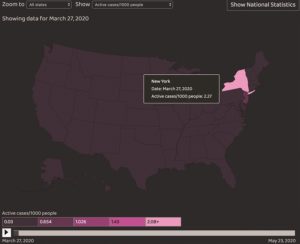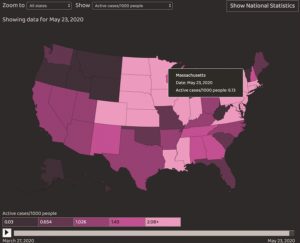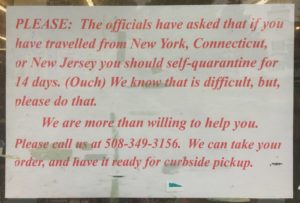PROVINCETOWN — On March 27, Gov. Charlie Baker issued an advisory that travelers into Massachusetts from other states should self-quarantine for 14 days. At that time, New York State was reporting 7,000 new coronavirus cases a day, while Massachusetts was reporting 700. New York was the center of the nation’s Covid-19 outbreak, and other states, such as Florida and Texas, were mandating that travelers from New York self-quarantine on arrival.
Now, two months later, Massachusetts has one of the highest rates of active cases per capita in the country, higher even than New York. (According to the Covid-19 Impact Analysis Platform, developed by the University of Maryland and available at data.covid.umd.edu, Massachusetts had 6.13 active cases per 1,000 people on May 23; New York State had 4.55 per 1,000.)

But the advisory that out-of-state travelers coming to Massachusetts sequester themselves for 14 days still stands, regardless of where they’re coming from or how they get here.
Along with the rest of the country, Massachusetts is restarting economic activity, and Gov. Baker has outlined a four-phase process. Phase one businesses reopened in late May, and phase two businesses are slated to reopen as early as June 8. In phase two, hotels may reopen and short-term rentals will be allowed for leisure travelers, which raises the question of who is allowed to engage in this leisure travel. Will hotels be asked to serve only in-state residents? Or will the 14-day quarantine advice for people arriving from out of state be changed by the time phase two arrives?
“We have clarity on the guidance for phase one,” said state Sen. Julian Cyr of Truro, indicating that the quarantine advisory will stay in place at least as long as phase one lasts. “I understand that questions remain regarding subsequent phases. This is something we have requested further clarification on from the Baker-Polito administration.”

Late May is traditionally the time of year that seasonal rentals begin, workers and part-time residents return to the Cape, and many businesses open. The return of these residents and workers transforms the region, and to help provide clearer guidance for the process, the Cape and Islands’ legislators, hospitals, and chambers of commerce developed a more detailed version of the governor’s advisory. It emphasizes social distancing and the use of contactless delivery for essentials such as groceries. And it says to stay home if you’re sick.
These are good ideas for almost anyone — which brings up two questions. First, how different is “self-quarantine” from normal social-distancing behavior? And second, why is the self-quarantine advisory directed only at out-of-state visitors, a distinction that now seems arbitrary?
“Blanket quarantine orders based on state lines don’t make sense,” said Steve Katsurinis, chair of Provincetown’s board of health. “I hope the governor will lift it. Especially when Boston has been one of the two hottest of hot spots in the U.S. Not allowing people from Maine or Rhode Island to come here when they have many fewer cases, and then not restricting people from Boston — it doesn’t make a lot of sense from a public health or science standpoint.”

According to the Mass. Dept. of Public Health, as of May 20 Boston’s Covid-19 active case rate was over 18 cases per 1,000 people, more than four times the rate for New York State. The rate for Rhode Island was 6.45 cases per 1,000 people, according to University of Maryland data.
“If you want to quarantine everyone not on Cape Cod, that would be one way to do it,” Katsurinis continued. “But allowing Boston to do no quarantine while you require it from people from Rhode Island, it’s nonsensical.”
Boundaries can have a way of persisting, though — especially when the people on the other side of the state line can’t vote for or against you. And the fact that the quarantine guideline is “only” an advisory means there may be no rush to remove it.



